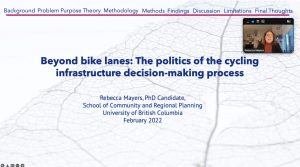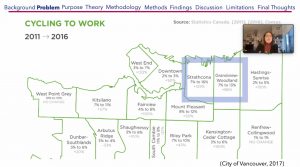
Rebecca Mayers presented her dissertation on the politics of cycling infrastructure and the decision-making process in a seminar that was open to the cycling community and finished with a debate. She did an in-depth research on a case study in Vancouver to examine the actors and processes that take part in the execution of the cycling infrastructure.
Rebecca frames her work within the political economy theory for it allows her to focus on the power balances and inequities that take part. She also aims to understand how the issues of equity are valued, determined, implemented, and evaluated throughout the decision-making process.

The actors identified were varied, including political figures, economic interests and organised civil society. One of the findings was that the decision to build the cycling infrastructure falls upon the willingness of certain people that act as gatekeepers. It usually does not follow the commandments of a plan. And often, the decisions are not based on the needs of cycling commuters but on the fear of public resistance.
In her study, Rebecca identified the local business voicing strong opposition to cycling infrastructure. They would have the power to leave a big part of the city free of any cycling infrastructure on the fear that it would be bad for business. The decision depended on people’s beliefs despite the evidence that street re-designs and cycling infrastructure increases revenue for local businesses.
The political strategy to give in to pressure is that once the new cycling infrastructure, placed in a non-conflictive location, proves useful and desired by residents, more ambitious work will come later. However, based on other experiences, resistance to new infrastructures is always present, while results are usually satisfactory. See the pedestrianization of Times Square in New York or the Cycling Ring in València.
 That means that we are losing an opportunity to engage with more people cycling because infrastructure is not placed in the fundamental locations that would make the most out of the cycling experience. Following recent studies, positive cycling experiences can improve the overall perception of cycling and reinforce its use (Janke & Handy, 2019). And the development of cycling perception, use and skills may all happen together (Thigpen, 2019). Giving reasons to create the most comfortable cycling experience from the beginning.
That means that we are losing an opportunity to engage with more people cycling because infrastructure is not placed in the fundamental locations that would make the most out of the cycling experience. Following recent studies, positive cycling experiences can improve the overall perception of cycling and reinforce its use (Janke & Handy, 2019). And the development of cycling perception, use and skills may all happen together (Thigpen, 2019). Giving reasons to create the most comfortable cycling experience from the beginning.
This leaves me with some questions: What happened to other local governments that decided to pursue their projects despite local resistances? What could help overcome resistances? More information about success cases? A city-wide or national-wide cycling strategy? Are there governance mechanisms that have dealt with this issue?
We will have to keep researching if we want an answer these questions.
Janke, J., & Handy, S. (2019). How life course events trigger changes in bicycling attitudes and behavior: Insights into causality. Travel Behaviour and Society, 16, 31–41. https://doi.org/10.1016/j.tbs.2019.03.004
Thigpen, C. (2019). Do bicycling experiences and exposure influence bicycling skills and attitudes? Evidence from a bicycle-friendly university. Transportation Research Part A: Policy and Practice, 123, 68–79. https://doi.org/10.1016/j.tra.2018.05.017


